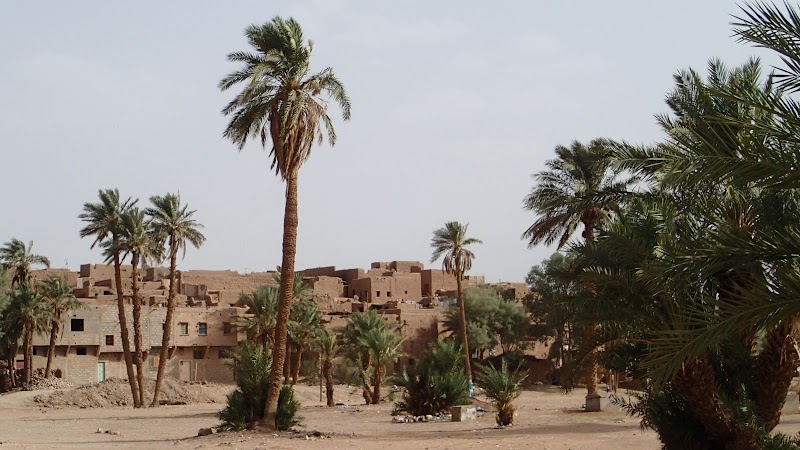Overnight Camel Trek to a Desert Camp Under the Stars in Zagora, Morocco
Experience the vast Sahara Desert through an overnight camel trek departing from Zagora, Morocco. Traverse sandy dunes and rocky plains to reach a remote desert camp, where an unspoiled night sky and authentic Berber hospitality await.
Stay Hydrated Constantly
Carry at least 2 liters of water per person and drink small amounts frequently to avoid dehydration in the dry desert air.
Wear Protective Footwear
Choose sturdy, broken-in hiking boots or closed-toe shoes to guard against hot sand and sharp stones during the trek.
Dress in Layers
Pack lightweight breathable fabrics for daytime heat and warm layers for cold desert nights to stay comfortable throughout the trek.
Book with Reputable Guides
Arrange your trek with experienced local agencies in Zagora to ensure safe navigation and cultural insight along your route.
Overnight Camel Trek to a Desert Camp Under the Stars in Zagora, Morocco
Setting out from the dusty outskirts of Zagora, Morocco, an overnight camel trek plunges you straight into the heart of the Sahara Desert. The trek covers roughly 30 kilometers of shifting dunes and rocky plains, presenting terrain that is both firm and yielding, demanding steady footing and a patient pace. Camels, steady as old hands, navigate these sands with a quiet confidence, their rhythmic steps syncing with the slow pulse of the desert wind. As the sun sinks, the sky unfurls into a broad canvas of stars—unfiltered by city glow—each constellation leaning down as if to greet you.
The journey begins mid-afternoon, when the desert sun still dares to hold its heat, giving way to cooler, sharper air by evening. Along the way, the desert whispers its own story: winds moving the sand in slow waves that push forward like a living creature, and the occasional stubborn acacia tree standing guard against the aridity. The camels, your patient companions, carry your gear while your body attunes to the steady sway of their movement.
Reaching the desert camp brings relief and a chance to engage with Berber hospitality. Tents rise from the sand, inviting escape from the cold night air. Smoke from a fire joins the crisp desert darkness, while the scent of spices and freshly brewed mint tea settle. The night sky offers an unparalleled spectacle—stars thick and bright, urging quiet reflection or lively storytelling.
Practical planning is crucial. Hydration is non-negotiable; carry ample water and sip regularly to keep pace with the desert’s demands. Footwear should be sturdy, closed-toe, and broken in, shielding your feet from abrasive sand and occasional jagged rock. Layers are your friend—days scorch, nights chill—and a hat and sunglasses defend against sun and glare.
Timing your trek for spring or fall ensures manageable temperatures and more comfortable nights. Avoid the height of summer’s relentless heat or the rare but biting winter cold. Book your caravan and guide through reputable local agencies in Zagora to navigate the desert safely and respectfully.
This trek is not a race but a conversation with an environment fiercely itself. Respecting its rhythms and limits invites a unique kind of exhilaration: the quiet achievement of moving alongside a landscape shaped by relentless forces. This isn’t conquering; it’s participating.
Prepare properly, embrace the steady pace, and you’ll find a desert experience that is as grounding as it is exhilarating—a night under vast stars in Morocco’s Sahara that stays with you long after the sand has slipped away.
Nearby Trips
All Adventures
Boat Charters
Water Activities
Adventures near Zagora
Discover the unique and memorable adventures that make Zagora special.
Frequently Asked Questions
How long does the overnight camel trek typically last?
The trek covers about 30 kilometers over two days, with roughly 4-5 hours of riding each afternoon and morning, plus time at the desert camp.
Is prior experience with camel riding necessary?
No prior experience is needed. Camels are well-trained and guides provide clear instructions to ensure a safe and comfortable ride.
What kinds of accommodations are at the desert camp?
Most camps offer traditional Berber tents with sleeping mats and blankets. Facilities are basic and focus on authentic desert experience rather than luxury.
What should I pack for the trek?
Pack lightweight clothing, a hat, sunglasses, water bottles, warm layers for nighttime, sturdy footwear, and personal toiletries. Avoid heavy luggage.
How do I protect myself from the desert sun?
Wear a broad hat, sunglasses, apply high SPF sunscreen regularly, and seek shade during peak sun hours, especially when resting at stops.
Are there any health risks associated with the trek?
Heat exhaustion and dehydration are the main risks. Follow guide instructions, drink plenty of fluids, pace yourself, and inform guides about any medical conditions.
Recommended Gear
Hydration pack or multiple water bottles
Essential for maintaining hydration in the dry desert environment.
Sturdy hiking boots
Protects feet from hot sands and sharp terrain during trekking sections.
Wide-brimmed hat and sunglasses
Provides crucial sun protection in the intense desert sunlight.
Warm layers and a windbreaker
Necessary for chilly desert nights and windy conditions.
Local Insights
Hidden Gems
- "The palm groves of Tighmert near Zagora provide unexpected shade and shelter along the route."
- "Small, natural wells still used by nomads offer a rare glimpse of traditional desert survival."
Wildlife
- "Desert lizards dart between rocks at dawn."
- "Fennec foxes occasionally appear at campsite edges after dusk."
History
"Zagora historically served as a gateway to trans-Saharan trade routes, making its desert paths significant for centuries of caravan travel and commerce."

